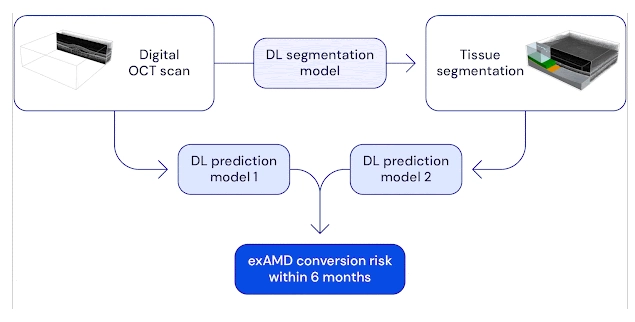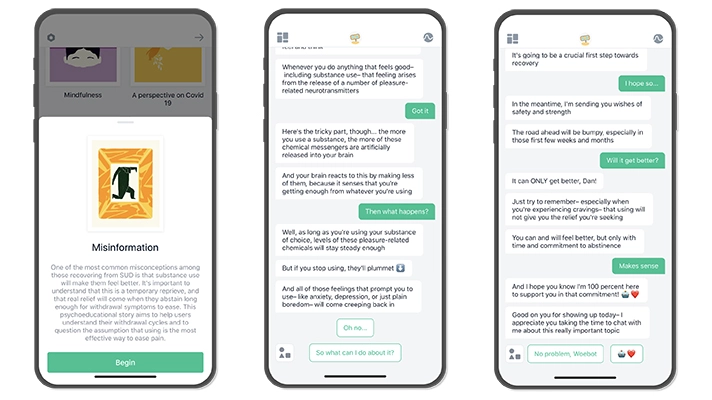The computing capability of deep learning models can enable fast, accurate and efficient operations in patient care, R&D and insurance.
Generative AI, computer vision, natural language processing, reinforcement learning are the most commonly used techniques deep learning in healthcare.
IDC claims that:
- Research in the pharma industry is one of the fastest growing use cases
- Global spending on AI will be more than $110 billion in 2024
Patient Care
1. Check-in with patients
Hippocratic AI released a number of LLM-powered nurse personas to check-in with patients
- before operations (e.g. colonoscopy) to ensure that they are well prepared
- after operations, as they adjust to their daily life
- dealing with chronic diseases
The company shares on its website that tens of hospitals in the US are testing the software.1
Such deep learning-based chatbots can answer questions of healthcare professionals or patients themselves.
2. Medical imaging
Image recognition and object detection are used in Magnetic Resonance (MR) and Computed Tomography (CT) processes for image segmentation, disease detection, and prediction. Deep learning models can effectively interpret imaging data by combining aspects such as tissue size, volume, and shape. These models can flag important areas in images.
For example, deep learning algorithms are used to detect diabetic retinopathy, early Alzheimer’s, and ultrasound breast nodule detection. Thanks to new advances in deep learning, most pathology and radiology images can be investigated in the future.
Deep learning algorithms simplify complex data analysis, so abnormalities are determined and prioritized more precisely. The insights that convolutional neural networks (CNNs) provide help medical professionals identify health issues in their patients more accurately and in a timely manner.
For example, CNNs identified melanoma disease in dermatology images with more than 10% accuracy than experts according to a study in 2018.
You can also read our article on Computer vision in the healthcare sector and companies in AI-powered medical imaging.
Google DeepMind: Google’s DeepMind has been collaborating with healthcare institutions to create AI models for medical imaging.
In one notable case, DeepMind developed a model to detect over 50 different eye diseases using retinal scans, assisting healthcare professionals in diagnosing conditions such as diabetic retinopathy and macular degeneration at earlier stages2 .

Figure 1: AI system for predicting exAMD.
3. Healthcare data analytics
Deep learning models can analyze electronic health records (EHR) that contain structured and unstructured data, including clinical notes, laboratory test results, diagnoses, and medications at exceptional speeds with the highest possible accuracy.
Also, smartphones and wearable devices provide useful information about lifestyle. They have the potential to transform data by using mobile apps to monitor medical risk factors for deep learning models. In 2019, Current Health’s AI wearable device became one of the first AI medical monitoring wearables approved by the Food and Drug Administration (FDA) for use at home.
Feel free to read our examples on Healthcare Analytics for more.
4. Mental health chatbots
The use of AI-based mental health apps (including chatbots) such as Happify, Moodkit, Woebot, and Wysa is increasing. Some of these chatbots can leverage deep learning models for more realistic conversations with patients.
A study by Stanford University shows that an intelligent conversational agent can significantly decrease depression and anxiety symptoms in students, and it is an efficient and engaging way to deliver mental health support.
Real-life example:
Woebot is an AI-powered mental health chatbot that uses natural language processing and deep learning in healthcare to have conversations with users, providing cognitive behavioral therapy (CBT) techniques to help reduce anxiety and depression symptoms. A study by Stanford University showed that Woebot could significantly reduce symptoms in users by offering timely support and helpful strategies for mental health management3 .

5. Personalized medical treatments
Deep learning in healthcare solutions enables healthcare organizations to deliver personalized patient care by analyzing patients’ medical histories, symptoms, and test results. Natural language processing (NLP) provides insights from free-text medical information for the most relevant medical treatments.
Real-life example:
IBM Watson utilizes deep learning and natural language processing (NLP) to analyze vast amounts of medical literature, patient data, and treatment protocols, suggesting personalized cancer treatment options. Watson cross-references patients’ genetic profiles and medical histories with the latest oncology research to recommend the most effective treatment plans for individual patients4 .
6. Prescription audit
Deep learning models can audit prescriptions against patient health records to identify and correct possible diagnostic errors or prescription errors.
Real-life Example:
Frost & Sullivan has reported that AI-driven systems, including those utilizing deep learning in healthcare, are employed by hospitals and insurance companies in prescription audits to detect medication errors. These systems cross-check prescriptions against patient health records to flag any inconsistencies or potential harm due to incorrect medications.
Health Insurance
7. Underwriting
Deep learning models help insurance companies to make offers to their customers by powerful predictive analytics. For more, check our article on how AI is used to improve underwriting processes.
Real-life Example:
Lemonade uses AI and deep learning models to optimize its underwriting processes. By analyzing customer data and predicting risk more effectively, the company offers more accurate and faster insurance policies, reducing the need for human involvement5 .
8. Fraud detection
Also, deep learning algorithms identify medical insurance fraud claims by analyzing fraudulent behaviors and health data from different resources such as claims history, hospital-related information, and patient attributes.
Research & Development
9. Drug discovery
With new technological advances, the contributions of deep learning models to drug discovery and interaction prediction have been growing. Deep learning in healthcare algorithms can identify viable drug combinations by processing genomic, clinical, and population data rapidly. Researchers in the pharmaceutical industry use deep learning toolkits to focus on patterns in these large data sets.
10. Genomics analysis
Deep learning models increase interpretability and provide a better understanding of biological data. Their complex data-analyzing capabilities support scientists while they study the interpretation of genetic variation and genome-based therapeutic development. CNNs are commonly used, enabling scientists to extract attributes from fixed-size DNA sequence windows.
Real-life Example:
23andMe uses deep learning in healthcare to analyze genetic data and provide insights into hereditary risks for conditions like cancer and heart disease. Their AI-driven platform helps individuals understand genetic variations that could impact their health6 .
11. Mental health research
Researchers are working to enhance clinical practice in mental health by utilizing deep learning models. For example, there are ongoing academic studies about understanding the effects of mental illness and other disorders on the brain by using deep neural networks. Researchers suggest that training deep learning models in healthcare can yield better results in certain areas compared to standard machine learning models. For example, deep learning algorithms can learn to determine meaningful brain biomarkers.
Another study aims to build a cost-effective, digital, data-driven clinical decision-support system in mental health with machine learning capabilities.
12. Pandemics
Deep learning models have gained importance with the global COVID-19 outbreak. Researchers studied deep learning in healthcare applications for
- early detection of COVID-19
- analyzing of Chest X-ray (CXR) Chest CT images
- predicting intensive care unit admission
- helping to find potential patients who have high risk for Covid-19
- estimating need for mechanical ventilation
However, these tools did not reach wide-scale acceptance due to data issues and other adoption challenges.7
If you are ready to use deep learning in healthcare business, we have prepared a data-driven list of companies offering deep learning platforms. Also, feel free to check out our AI use cases in healthcare research.
You can also check the following data annotation services and tools list to select the option that best fits your business needs:
- Open-source data labeling platforms
- Data annotation services
- Medical data annotation tools
- Video annotation tools
The Newest Innovations in Deep Learning for Healthcare
Recent advancements in deep learning include Transformer-based models like OpenAI’s GPT-4 for medical language understanding and NVIDIA’s BioNeMo for biomedical research. These innovations enable faster analysis of medical texts, enhancing decision-making in healthcare.
Additionally, the integration of federated learning in platforms like Owkin ensures patient privacy while training deep learning in healthcare models across decentralized datasets. This approach is particularly impactful in collaborative research for rare diseases.
FAQ
1. How is deep learning transforming healthcare?
Deep learning is revolutionizing healthcare by enabling early disease detection, personalized treatment plans, and faster drug discovery. It automates complex tasks like medical imaging analysis, genomic data interpretation, and electronic health record management, improving accuracy and efficiency in patient care.
2. What are some popular deep learning tools used in healthcare?
Popular tools include TensorFlow and PyTorch for building predictive models, IBM Watson Health for personalized medicine, NVIDIA Clara AI for medical imaging and genomic analysis, and Google DeepVariant for interpreting genetic data.
3. What are the ethical concerns with deep learning in healthcare?
Ethical concerns include patient data privacy, algorithmic biases, and the potential for over-reliance on AI-driven decisions. Federated learning and strict regulatory compliance help mitigate some of these issues.
Further reading
External Links
- 1. Hippocratic AI.
- 2. From social media to conference social. Nature Publishing Group UK
- 3. “Woebot: AI-Powered Mental Health Support“. Stanford Medicine. Retrieved on Oct 3, 2024
- 4. Top 3 IBM Watson Competitors in 2025. AIMultiple
- 5. Top 7 Technologies that Improve Insurance Underwriting. AIMultiple
- 6. DNA Genetic Testing For Ancestry & Traits - 23andMe International.
- 7. Hundreds of AI tools have been built to catch covid. None of them helped. | MIT Technology Review. MIT Technology Review

Comments
Your email address will not be published. All fields are required.